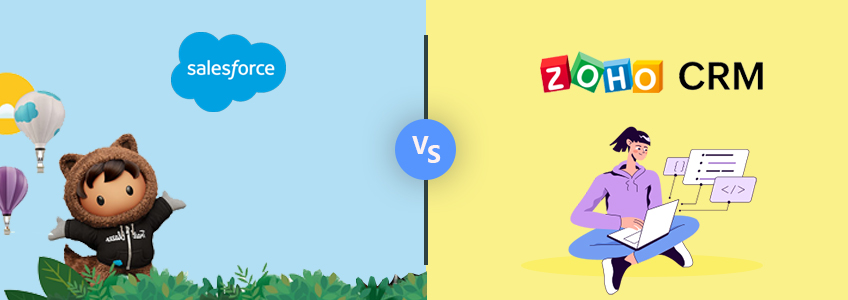
Is Salesforce or Zoho CRM a better fit for your company? We’re here to assist you in making a decision with our comprehensive comparison of the two widely used CRMs.
Client relationship management (CRM) used to imply time-consuming manual processes such as address books and spreadsheets, but CRM software has replaced this with a unified contact management system that assists firms in building and maintaining customer relationships.
CRM has evolved into a vital business enabler for teams in marketing, sales, support, and accounting as a result of the recent spike in the use of cloud software. According to a recent study, 91% of organizations with 11 or more employees utilize CRM software. It is now the world’s fastest-growing software market.
CRM is, therefore, an absolute necessity. However, in order to effectively profit from your CRM operations, you must select the correct solution and examine a variety of variables, ranging from the simplicity of implementation to connectors to user experience.
You’ve most likely heard of Salesforce. It’s a titan in the sector with a market share of over 19%, but there are many other options as well.
Zoho, an on-demand platform with a significant growth rate and a Chennai, India, base, is one of the many others.
Continue reading to compare the two CRM platforms side by side.
Salesforce | Zoho |
Salesforce is a cloud-based customer relationship management (CRM) platform that provides apps for sales, service, marketing, and other functions that help connect customers and businesses. | Online sales customer relationship management (CRM) software called Zoho CRM controls your marketing, sales, and support from one CRM platform. |
Comparison Between Zoho CRM with Salesforce Features:
Contact management, reporting, sales enablement, and team communication are all available through Zoho and Salesforce.
While Salesforce is unquestionably the industry standard, Zoho CRM offers inexpensive prices and connections with a wide range of other business tools and procedures.
Here is a high-level overview of what each platform has to offer.
1. Simple to use:
When it comes to selecting features and modifying the user interface, both Zoho CRM and Salesforce offer significant customization possibilities. They also feature capabilities for filtering data in large contact lists and sales pipeline views.
While the design is reasonably basic for beginning users, the sheer number of capabilities accessible might be intimidating.
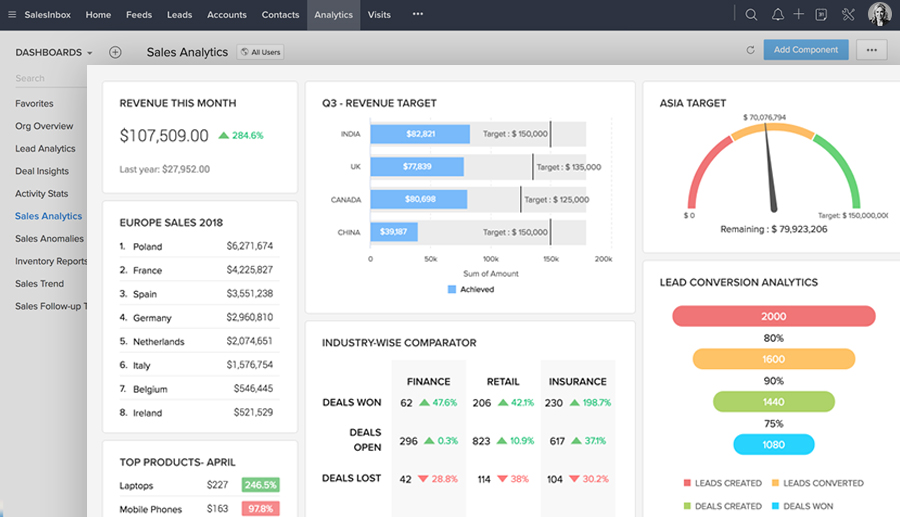
However, Salesforce is significantly more complicated internally, which is why many companies employ a dedicated administrator to supervise implementation and management or contract out the work to a managed services provider (MSP).
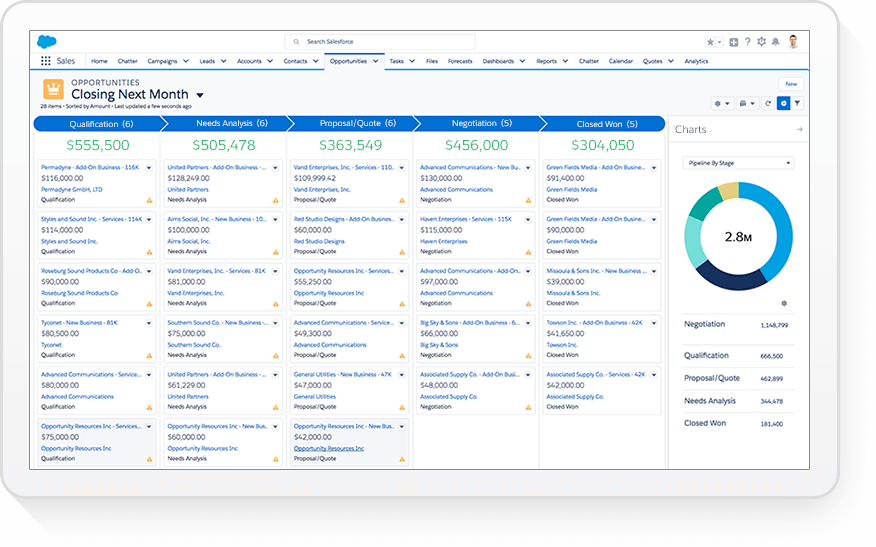
Salesforce and Zoho CRM ease of use comparison: If you want something set up more quickly, go with Zoho; if you want something that will be easier to manage and deploy, go with Salesforce.
2. Automation:
Workflow automation is critical for any company. It’s also one of the most significant advantages of switching to professional CRM software. Both Zoho and Salesforce are perfectly capable of automating various typical activities using a combination of graphical data-driven insights and rule-based lead scoring.
You can automate critical operations with leads, contacts, accounts, deals, and tasks with Zoho’s free plan, while sales forecasting is available with Standard and “Sales Signals” with Professional.
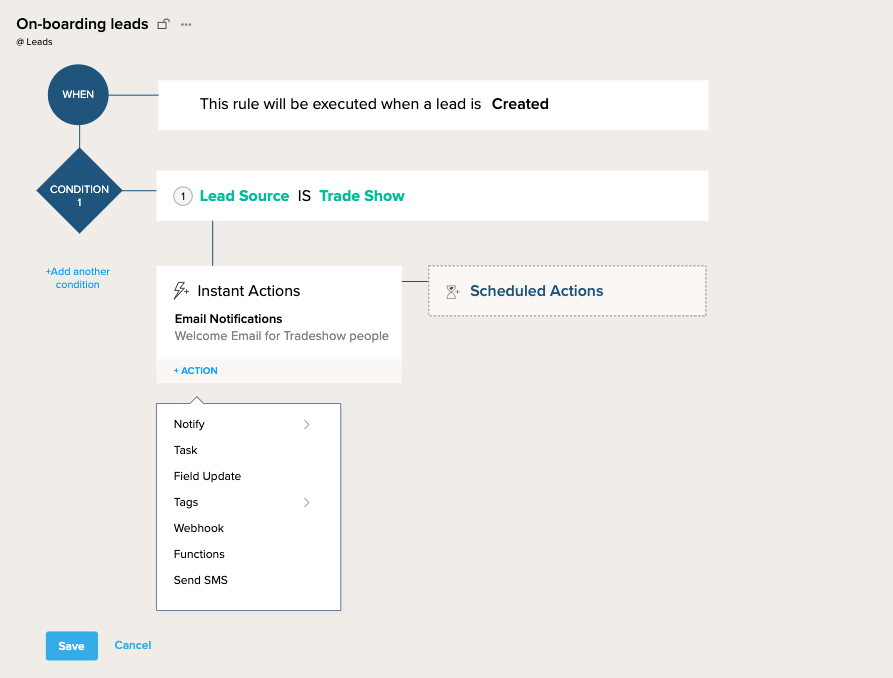
Lead registration, collaborative forecasting, and rules-based lead scoring are available with Professional ($75/user/month) while workflow automation and approval automation are available with Enterprise ($150/user/month).
The CRMs on both platforms also offer marketing automation, but Salesforce goes a step further by allowing you to use Pardot, their B2B marketing automation tool. This necessitates a significantly larger budget: Pardot costs $1,250 per month for up to 10,000 contacts.
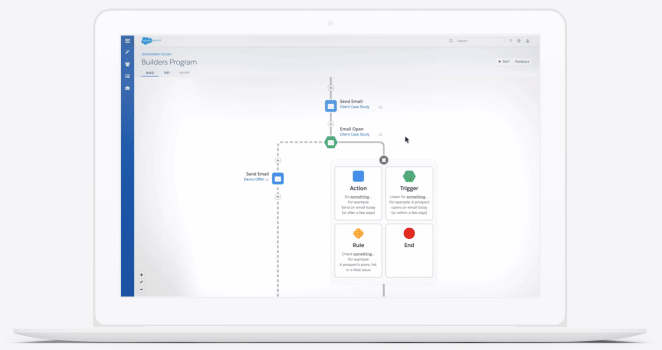
Salesforce is, at least potentially, the more versatile of the two, but it requires higher subscription tiers and third-party connectors for smooth interfaces and automation.
When comparing Zoho CRM with Salesforce automation, consider the following: As with much of Salesforce, you can automate almost anything if you pay enough. However, if you’re on a tight budget, Zoho is a far better option.
3. Integration and teamwork:
Information removal When selecting new software, silos should be prioritized. Even in small businesses, rapid development can produce a lot of friction if everyone is utilizing separate systems that don’t get along.
Both CRMs offer a variety of connections to help facilitate information sharing and collaboration across cloud settings. This allows for better collaboration among sales, marketing, support, and other fundamental company activities.
Salesforce and Zoho both offer an open application programming interface (API) for third-party app integration. They also have out-of-the-box connections with major collaboration and file-sharing services such as Slack, OneDrive, Dropbox, and Google Drive.
Zoho has a wide number of integrations out of the box, with the Professional and above tiers including integration with major social media networks and office productivity suites like Office 365 and G Suite, You can also look into Zoho’s extensive integration library.
Salesforce may be integrated with virtually any business tool.
When it comes to team connections and integrations, Zoho CRM and Salesforce both perform well when utilized across departments to link teams.
4. Agility:
When selecting a CRM, it is critical to select something that can support future business growth. Moving to a new CRM can be expensive and time-consuming, especially if it involves reworking many integrations.
Zoho offers compellingly low-cost plans for small businesses, but it also has an Enterprise tier to meet the needs of larger enterprises. The same is true of Salesforce, but it unquestionably wins in terms of scalability, thanks in large part to its status as a global industry standard.
Agility Comparison: Salesforce vs. Zoho: Salesforce is one of the most scalable CRM platforms available, but it requires a large budget. Zoho is much more approachable to small and medium-sized businesses.
5. Commercials:
Zoho CRM has five pricing tiers, whereas Salesforce Sales Cloud has four. Zoho offers a free subscription that is appropriate for very small businesses with three or fewer users. The Standard subscription costs $12 per user per month, the Professional version is $20, the Enterprise edition is $35, and the Ultimate edition is $45.
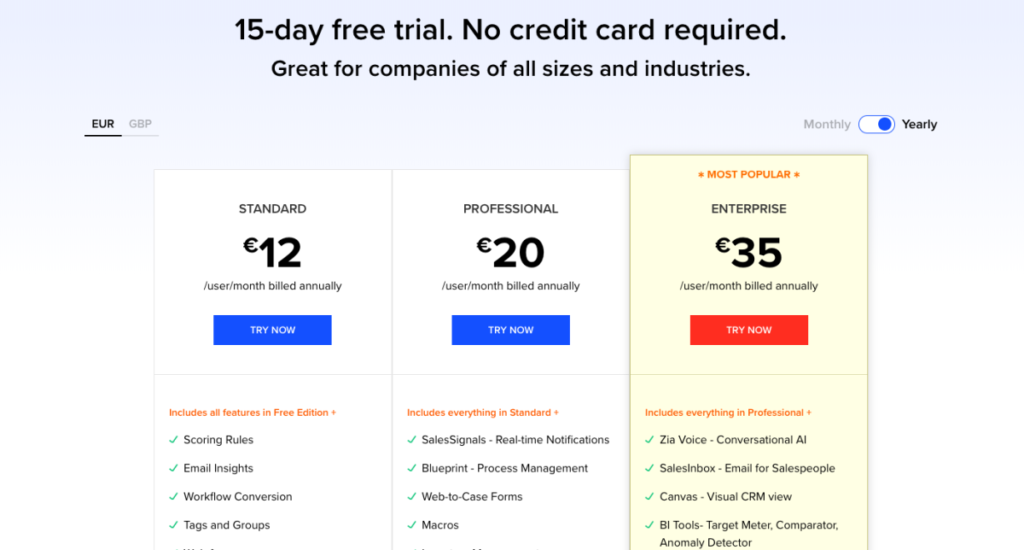
Salesforce’s Sales Cloud starts at $25 per user per month for the Essentials version, $75 for the Professional package, and $150 for the Enterprise package. A monthly fee of $300 is charged for the unlimited version.
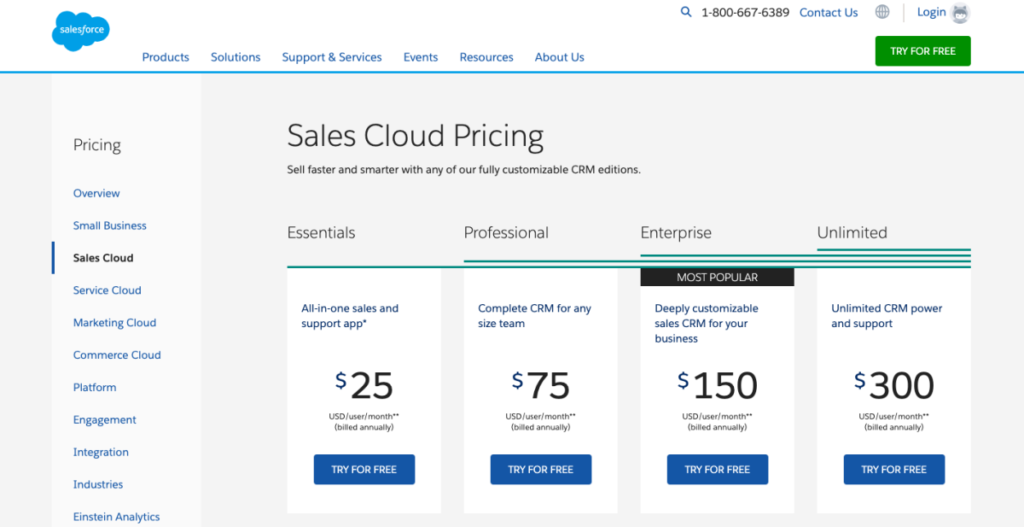
Most SMBs will opt for a standard Zoho subscription or Salesforce Essentials. Both offer a robust feature set that includes contact management, mass mailing, and reporting. Users of Zoho can integrate their sales tools with the rest of the company’s productivity and office tools, whereas Salesforce has a robust app ecosystem.
Despite being one of the most expensive CRMs available, Salesforce Professional has by far the most robust feature set, including advanced reporting, role permission management, and rules-based lead scoring.
Commercials for Salesforce vs. Zoho CRM: The possibilities with Salesforce are endless, but the value and functionality you require come at a higher price. As an alternative to Salesforce, you can get started with Zoho CRM for free.
When should I choose Salesforce?
For larger companies as well as smaller ones that anticipate rapid growth over the coming years, Salesforce is typically the best option.
While it is significantly more expensive to implement and maintain than many other platforms, it is also one of the most versatile. Support is also widely available. However, it may be overkill for smaller businesses with a small team and no need for a highly advanced and complex system.
When should I choose Zoho?
Zoho CRM is a great choice for small businesses looking for an affordable all-in-one solution because their plans are generally significantly less expensive than Salesforce.
The free-for-ever tier is ideal for very small businesses as well as those who want to put it through its paces. Zoho is also better suited for businesses without a dedicated IT department because it is easier to deploy and maintain.

Do You Need more information?
For any further information / query regarding Technology, please email us at info@varianceinfotech.in
OR call us on +1 630 534 0223 / +91-7016851729, Alternately you can request for information by filling up Contact Us
 Please wait...
Please wait...
Leave a Reply